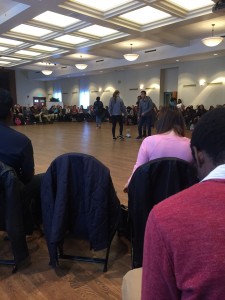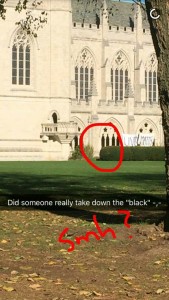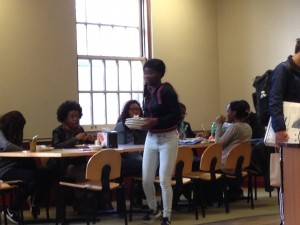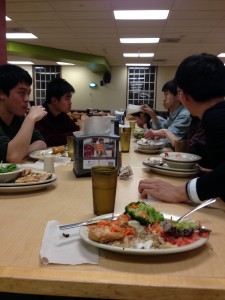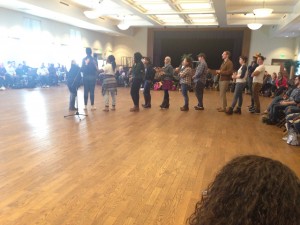Since first coming to Trinity 3 months ago, I use to think race wasn’t such a big deal anymore and that it was more of a thing of the past. My awareness of racism and perception of its effects on everyday lives has significantly increased. Not only that, but I’ve also had to dealt with something completely new to me. I’ve always heard about how minorities have had a hard time fitting in, having to adjust, and even succeeding, but I had never experienced it firsthand before coming to Trinity. Since the first time I realized I was now a minority my whole outlook on race significantly change.
Coming from Panama, being part of the majority, I felt like I was similar to all of the people around me and never had to make an effort to fit in. All of my classmates and friends had the same tastes in music and food and even had a similar sense of humor as me. In Panama people are not divided into categories based on their skin color or social class. There are all types of races and ethnicities but everyone is just seen as Panamanian. I went to school with a few black kids and several kids of lower social classes; but the majority of my classmates were just like me. I never felt out of place and much less like I needed to adjust in order to fit in. My family was also very wealthy and known throughout the country. I knew my name could get me places without having to work as hard as some other people had to; but all these feelings of comfort disappeared as I left Panama with the goal of obtaining a better education.
At first everything seemed normal, I got along really well with my roommate and my hall mates were all really nice. It wasn’t until I started to go out on the weekends and meet lots of new people that I realized that I was different from everyone else. All these new people I was meeting were completely different from me. They didn’t like the same type of music as me, their sense of humor was not similar to mine, and they were always drinking beer, which I hated. My accent did not help either. I felt frustrated every time someone wouldn’t understand my name or something I was trying to say; which made me hesitant to talk when I was with large groups of people. All the little things made me feel like maybe Trinity was not the right place for me. I started to second-guess my decision of coming to Trinity and started to get worried.
All my friends who had gone to college before me or at the same time, had gone to bigger universities where they had made dozens of Latin American friends by the end of orientation. I knew none of them felt like me since I was the only one attending a small liberal arts college were Latin Americans were hard to come by. They could not understand what I was going through. When thinking about life at Trinity, it never occurred to me that my race and ethnicity would affect my experience in any way. This was a whole new experience for me.
After a couple weeks feeling lost, my experience at Trinity slowly started to change. My great relationship with my roommate and hall mates started to increase my level of comfort. My accent didn’t bother me anymore, and I even learned to like different types of music. This level of comfort I gain from spending time with them started to translate into my social life and even into my classes. I became less hesitant to participate in class or introduce myself to new people. For the firs time since I left Panama, I didn’t feel like I needed to try to be someone different in order to fit in. I embraced the things that made me different and it made all the difference.
People from foreign countries or even forming part of a racial minority tend to struggle to fit in at predominantly white colleges. It’s true part of this is due to the segregation that they encounter at these institutions like Trinity; but a lot of that lack of comfort and struggle to fit in we sometimes feel, can be a mechanism of self-defense created by our fear of not being liked because of our race or ethnicity. Looking back to my hard times the first couple weeks of school, I feel a big part of my lack of comfort was the outcome of my fear of not being accepted they way I was. I felt like I needed to adjust and become someone else when no one had given me a reason to think so.
Racism is still a major problem in today’s world, but sometimes our fear of it can make us feel out of place before having even tried to put ourselves out there. In my case this was definitely the case. I was having a hard time and struggling to feel comfortable at Trinity just because I had realized I was not like everyone else anymore. I was not in Panama anymore, and the new experience of being a minority was frightening for me. My fear of being rejected for being different blinded me from realizing I had no problem fitting in. Since my first day at Trinity I had made good friends with my roommate and my hall mates, but outside of my dorm it felt like a different place and it took me sometime to translate that confidence I had with them to the social scene at Trinity.
I never felt like I was being discriminated because of my race in any way, but during my first semester at Trinity, my view of the role race can play in our everyday lives has significantly changed. Attending a school in another country, or even one in which you’re part of the racial minority for the first time is sure to be a difficult transition; but we tend to make it even tougher for ourselves by thinking we won’t fit in without having really tried. The main reason I felt out of my comfort zone during my first weeks at Trinity was because I was different. Never did anyone do a certain thing to make me feel this way. I just inferred that by being somewhat different from everyone else I wouldn’t fit in. Three months after feeling that way, I can’t even express how wrong I was by thinking maybe Trinity was not the right place for me. It only took a change in approach for everything to change. As soon as I stopped thinking being different was preventing me from fitting in my whole experience here completely changed. The transition from a majority to a minority might seem scary, but an open mind and a positive attitude come a long way in making it a rather smooth one.

